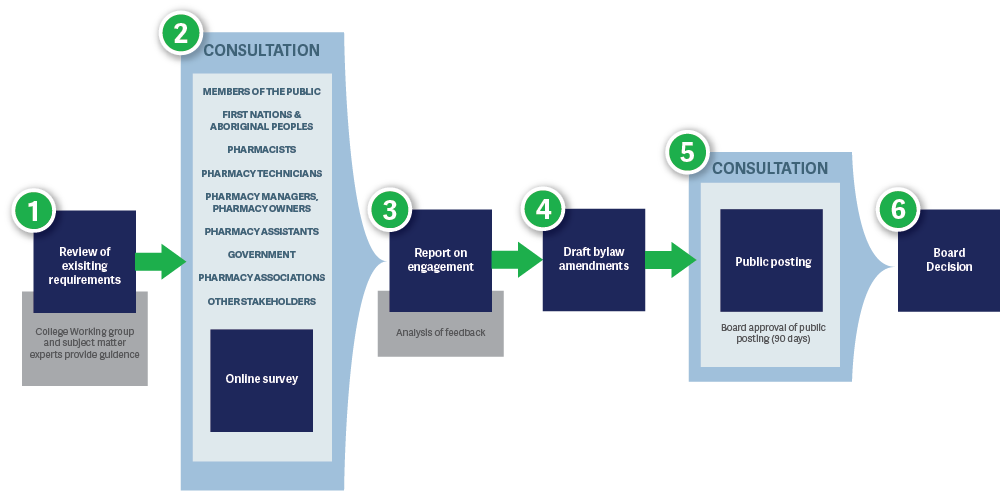we want to hear from you: Protecting the Public through Pharmacy Manager Requirements
From November 28 – December 12, 2018, The College of Pharmacists of BC is seeking input from pharmacy professionals, health professionals and the public, into the responsibilities of pharmacy managers as we review our Pharmacy Operations and Drug Scheduling Act Bylaws to ensure they can protect the public now and into the future.
Pharmacy managers play a crucial role in ensuring safe pharmacy practices for the public. They have distinct and extensive responsibilities under the Pharmacy Operations and Drug Scheduling Act and the College’s related Bylaws. Specific responsibilities include but are not limited to:
- The day-to-day management of the pharmacy,
- Ensuring that patient care requirements are met in accordance with the Bylaws, Code of Ethics and standards of practice,
- Ensuring appropriate security and storage for drugs and controlled drug substances, and,
- Ensuring that confidentiality is maintained with respect to all personal health information.
The College is seeking your feedback on several key areas of pharmacy safety which fall under the responsibilities of a pharmacy manager, including:
- Consistent use of a pharmacy name to ensure it is easily identifiable by the public,
- Maintaining up-to-date information on where pharmacy professionals are working to support complaints and inquiries from the public,
- Ensuring pharmacy staff have immediate access to the most current public safety-related information on drugs and devices,
- Ensuring the public can easily identify the professional training and credentials of the pharmacy staff person they are interacting with,
- Ensuring a pharmacy manager is sufficiently present in a pharmacy to protect public safety through the day-to-day management of the pharmacy,
- Best approaches for reporting prolonged absences from the pharmacy, and
- Securing temporary pharmacy licences to help provide continuity of care in cases of emergencies.
Who we need to hear from
- Members of the public (especially patients and the family, friends and communities that support them)
- First Nations and Aboriginal Peoples
- Registered pharmacy professionals (pharmacists and pharmacy technicians)
- Pharmacy managers
- Pharmacy owners
- Pharmacy staff support persons who are not regulated health professionals (such as pharmacy assistants)
- Other healthcare professionals
- Other interested stakeholder groups
- Government (such as program staff who may interact with pharmacies in their communities or as part of emergency preparedness plans)
Your feedback will be used to help draft revised bylaws. The College will also consider best practices for developing bylaws such as the concept of Right Touch Regulation. Right Touch Regulation means always asking what risk we are trying to regulate, being proportionate and targeted in regulating that risk or finding ways other than regulation to promote good practice and high-quality healthcare.
Take the Survey |
Modernizing our Bylaws under the Pharmacy Operations and Drug Scheduling Act
As part of the College of Pharmacists of BC’s 2017-2019 Strategic Plan, we are conducting a comprehensive review of the requirements under the Pharmacy Operations and Drug Scheduling Act (PODSA) Bylaws. The key focus areas of this project are:
- Amending the PODSA Bylaws to be clearer and address any duplication in the Bylaws and policies.
- Standardizing and transitioning policies to Bylaws, where needed.
- Ensuring that the PODSA Bylaws and policies have consistent writing style and structure.
Pharmacy manager responsibilities are a key area that the College is looking at as part of this review. Stay tuned for more opportunities to contribute to others areas of the PODSA Bylaws review.
Engagement Process
This engagement is at the level of INVOLVE on the spectrum of engagement (based on IAP2 Participation Spectrum). This means the College has promised to ensure that public concerns and aspirations are understood and considered in the development of proposed bylaw amendments and other resources, and will provide feedback on how input affects the decision.

For further questions, please contact [email protected]
